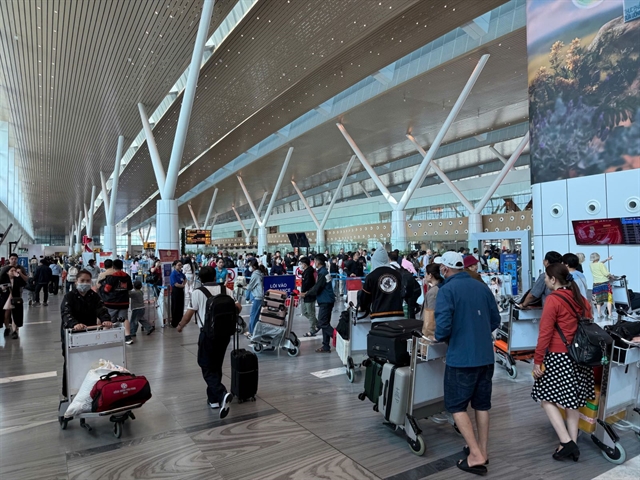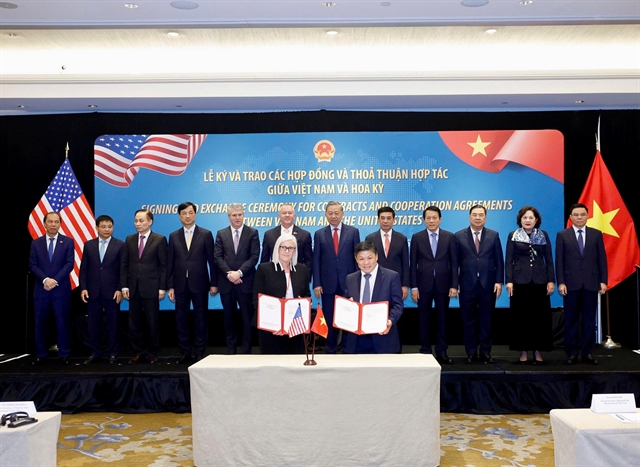 Society
Society

 |
| Phạm Thị Huệ with her students. — Photo giaoducthoidai.vn |
HÀ NỘI — Low income has become a major concern for many teachers, especially those new to the profession, driving them to take on extra work while continuing to devote themselves fully to educating the next generation.
When their salary is not enough to cover living expenses, they are forced to work extra, facing economic pressure and the risk of gradually losing their enthusiasm for teaching. The story of income is not just about 'bread and butter' but also has a direct impact on the quality of education and the level of commitment of teachers to the profession.
Extra work supports desire
Alongside teaching, Nguyễn Thị Thu Ba, a teacher at the ethnic semi-boarding Chu Văn An Primary School in Đà Nẵng, has a part-time job selling medicinal products from Trà My mountain forest such as Ngọc Linh ginseng, wild honey, traditional herbal tea and uniforms.
Ba told giaoducthoidai.vn: “When I first joined the staff, the salary was low, my children were still young. Because of teaching in a mountainous area, I could not think of teaching extra classes to earn income.
“Selling online helped me have more money to buy milk and improve my children's meals.
“In 2022, when the salary increase had not been implemented, with a salary of VNĐ9 million (US$350) per month after 13 years of teaching, to be honest, without income from the online job, it would be very difficult to save, not even enough to live on.”
Teachers like Ba are using their side jobs to nurture their passion for their main job, leaving the worries of making a living behind the classroom door, and wholeheartedly devoting themselves to each teaching session.
For teacher Trần Thị Huệ, 35, in Đồng Lê Commune of central Quảng Trị Province, the path to teaching was not smooth.
Graduating from pedagogical college in 2013, she was only recruited as a primary school teacher on a fixed-term contract four years later. After a few years, she continued to work on contract at another school.
After 10 years working as a contract teacher with a meagre income of VNĐ3–4 million ($120–180) per month, her life was very tough with three children.
Huệ said that in order to have more income to cover the family's living expenses, in recent years she has sold goods online, raised chickens and grown vegetables to earn extra money and share the economic burden with her husband.
"With a modest income from the profession, I often thought about quitting the job. But every time I imagined having to leave school and no longer being able to meet and answer curious and eager questions from students every day, I put that thought aside and continued to stick with the teaching profession,” Huệ said.
“I just hope that my career will not fail my efforts and dedication."
At the beginning of the 2025–26 school year, she was accepted to teach at Đồng Lê Primary School under an indefinite contract.
She sees this as a new step on the journey to becoming a full teacher, with the hope of soon easing her worries about food and clothing and confidently dedicating herself to her profession.
'Anchored' to the profession
 |
| Teacher Nguyễn Văn Nhân with his ethnic student in Ông Yen Primary School. — Photo giaoducthoidai.vn |
Teacher Nguyễn Văn Nhân has been teaching under contract at Trà Leng 1 Semi-Boarding Primary School for Ethnic Minorities in the mountainous area of Đà Nẵng City since 2011.
His starting salary was under VNĐ4 million ($157) per month, later raised to VNĐ6 million ($236).
While teaching, he also used his spare time to pursue a university degree at Quảng Nam University. By mid-2023, he had completed the programme and was waiting to take the civil service recruitment exam for the education sector.
For the 2025–26 academic year, he was assigned to Ông Yen School in a remote commune, one of the 'three-Nos' areas: no schools, no electricity, no phone signal, no paved road – deep under the ancient forest canopy of Ngọc Linh.
Here, teachers are completely cut off from the outside world with no mobile signal, no access to the national power grid, and water must be channelled from nearby streams.
Each week, Nhân travels roughly 25km through the forest to reach the school site, walking more than half the way.
He currently teaches a combined class of 11 pupils from grades 1 and 2 and also looks after five kindergarten children in the same hamlet. Each semester, he receives an additional VNĐ7-8 million ($275–315) for extra teaching hours and multi-grade class allowances.
As the breadwinner of a young family – with a child not yet one year old and a wife still unemployed – his total monthly income averages about VNĐ7.5 million ($295), covering all daily expenses from fuel, rice and condiments to nappies and medicine.
Despite financial hardship, Nhân remains dedicated to his teaching. Since his pupils live around the school, he often runs free evening tutoring sessions. Thanks to his connections with benefactors, both pupils and local residents at the school sites where he has worked have received meaningful support.
“I was born and raised here, so I understand my students. If even I cannot stay in this profession, how can teachers from the lowlands come here to teach? Thinking that way helps me endure all the difficulties of family life and stay committed to my work,” he said.
 |
| The make-shift bridge the students and teachers of Ông Yen School use every day to go to school. — Photo giaoducthoidai.vn |
Improving teaching quality
The National Assembly issued a resolution piloting special mechanisms and policies for development that allow income multipliers of up to 1.8 times the base salary.
This is not merely a financial regulation but a crucial policy tool that motivates tens of thousands of teachers, who silently devote themselves to nurturing the next generation in one of the country’s most dynamic cities.
Over the years, this policy has proved effective.
For teachers, the extra income not only improves living conditions but also boosts morale and job satisfaction, fostering stronger commitment to the profession.
After nearly 30 years in education, Nguyễn Thị Hòa, a teacher at Minh Đức Secondary School in HCM City, expressed deep appreciation for the policy.
“With the high cost of living here, teachers rely almost entirely on their salaries. Sometimes we have to budget very tightly just to care for our families while staying devoted to the classroom,” she said.
Her monthly salary is now around VNĐ13 million ($511), with additional quarterly bonuses depending on performance.
“If rated excellent, I receive about VNĐ25 million ($983) per quarter; if rated good, about VNĐ18 million ($708),” she said.
“This is truly meaningful – beyond financial relief, it is emotional encouragement that helps teachers stay motivated and committed to the profession.”
Hòa shared that the policy has helped her stabilise her life.
“Most importantly, the additional income helps us keep the flame of passion alive after years of hard work. I believe this policy gives teachers greater peace of mind and dedication to nurturing future generations and building a humane, high-quality and modern education system for the city,” she said. — VNS




